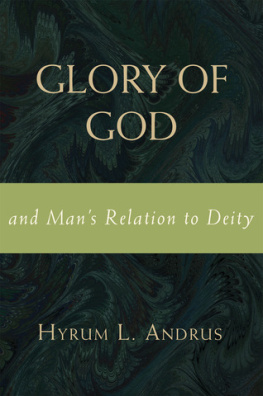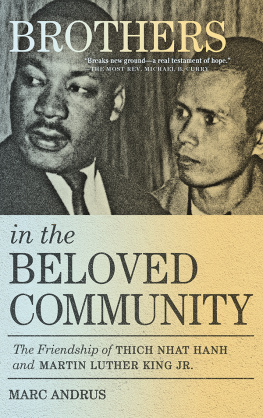Hyrum L. Andrus - Glory of God and Mans Relation to Deity
Here you can read online Hyrum L. Andrus - Glory of God and Mans Relation to Deity full text of the book (entire story) in english for free. Download pdf and epub, get meaning, cover and reviews about this ebook. year: 1964, publisher: Deseret Book Company, genre: Religion. Description of the work, (preface) as well as reviews are available. Best literature library LitArk.com created for fans of good reading and offers a wide selection of genres:
Romance novel
Science fiction
Adventure
Detective
Science
History
Home and family
Prose
Art
Politics
Computer
Non-fiction
Religion
Business
Children
Humor
Choose a favorite category and find really read worthwhile books. Enjoy immersion in the world of imagination, feel the emotions of the characters or learn something new for yourself, make an fascinating discovery.
- Book:Glory of God and Mans Relation to Deity
- Author:
- Publisher:Deseret Book Company
- Genre:
- Year:1964
- Rating:5 / 5
- Favourites:Add to favourites
- Your mark:
- 100
- 1
- 2
- 3
- 4
- 5
Glory of God and Mans Relation to Deity: summary, description and annotation
We offer to read an annotation, description, summary or preface (depends on what the author of the book "Glory of God and Mans Relation to Deity" wrote himself). If you haven't found the necessary information about the book — write in the comments, we will try to find it.
This is Hyrun L. Andrus book Glory of God and Mans Relation to Diety.
Glory of God and Mans Relation to Deity — read online for free the complete book (whole text) full work
Below is the text of the book, divided by pages. System saving the place of the last page read, allows you to conveniently read the book "Glory of God and Mans Relation to Deity" online for free, without having to search again every time where you left off. Put a bookmark, and you can go to the page where you finished reading at any time.
Font size:
Interval:
Bookmark:


1964 Deseret Book CompanyAll rights reserved. No part of this book may be reproduced in any form or by any means without permission in writing from the publisher, Deseret Book Company, P.O. Box 30178, Salt Lake City, Utah 84130. This work is not an official publication of The Church of Jesus Christ of Latter-day Saints. The views expressed herein are the responsibility of the author and do not necessarily represent the position of the Church or of Deseret Book Company.Deseret Book is a registered trademark of Deseret Book Company.
THE GREATNESS AND MAJESTY OF GOD
Because man is created in the image of God, he is like Him in certain respects. But in our minds, either intentionally or unintentionally, we often reduce God to the status of a man. We say that God is an anthropomorphic [being] which in a sense is true, but I would like to begin today by approaching the subject of man and his relation to Deity from a different angle, by saying that man is theomorphic; that is, there are certain aspects of man that are like God, but these are somewhat limited as yet. Though we have the great ideal of attaining unto the fulness of the measure of the stature of Christ, still that which man possesses todayin comparison with Godis very limited.
Besides being a personage of tabernacle, God is a personage of glory. But when we refer to Him as a personage of glory, we are somewhat hazy in our understanding. So let me turn to the scriptures and give two or three references to clarify this point. Let us first refer to the vision of Joseph Smith, when as a youth of fourteen he went into the Sacred Grove to pray. Said he of that great manifestation:
... I saw a pillar of light exactly over my head, above the brightness of the sun, which descended gradually until it fell upon me....
... When the light rested upon me I saw two Personages, whose brightness and glory defy all description, standing above me in the air.... (Joseph Smith 2:16, 17.)
Even though the Prophet actually saw the Father and the Son, he was still unable to describe Deity. He was unable to do so because of their greatness, glory, and majesty, which outshone the sun at noonday. Thus, it is evident that God is more than a man. God is a glorified personage, and the full brilliance of His glory cannot be understood, comprehended, or experienced by mortal man.
Let me turn to the Doctrine and Covenants, Section 110, and give you another testimony by the Prophet Joseph Smith to introduce our discussion today. Here we find the Prophet's report of the appearance of Christ in the Kirtland Temple, preceding the appearance of Moses, Elias, and Elijah. While the Prophet and Oliver Cowdery were praying in the temple, Joseph wrote: "We saw the Lord standing upon the breastwork of the pulpit before us." The Prophet then made a finite effort to describe an infinite being, as he sought to report that which they saw in open vision. Said he of the glorified Christ:
... under his feet was a paved work of pure gold, in color like amber.
His eyes were as a flame of fire; the hair of his head was white like the pure snow; his countenance shone above the brightness of the sun; and his voice was as the sound of the rushing of great waters, even the voice of Jehovah ... (D&C 110:2-3; italics added.)
Here again the glory of Christ is said to be above the brightness of the sun. It was out of this background that Joseph Smith made other efforts to explain the divine nature of Deity. Said he:
God Almighty Himself dwells in eternal fire; flesh and blood cannot go there, for all corruption is devoured by the fire. [And then he quoted the Apostle Paul:] "Our God is a consuming fire." When our flesh is quickened by the Spirit, there will be no blood in this tabernacle. Some dwell in higher glory [that is, brilliance or fire] than others.... Immortality dwells in everlasting burnings. All men who are immortal dwell in everlasting burnings.... (Documentary History of the Church, VI, 366; hereafter cited DHC.)
On another occasion Joseph Smith reported another vision in which he was shown the celestial kingdom and its glory:
The heavens were opened upon us and I beheld the celestial kingdom of God and the glory thereof [In other words, he saw not only the celestial kingdom, but the light or glory associated with it.], whether in the body or out of the body I cannot tell. I saw the transcendent beauty of the gate through which the heirs of that kingdom will enter, which was like unto circling flames of fire; also the blazing throne of God, whereon was seated the Father and the Son. (DHC, II, 380-381; italics added.)
Let me give you one other commentary, this one by Parley P. Pratt. In discussing his view of God, which view he received from the Prophet, he said:
God sits enthroned in the midst of his creations and is filled and encircled with light unapproachable by those of lower spheres. (Parley P. Pratt, Key to Theology, 9th Edition, p. 115.)
Note that from the foregoing statements it is evident that God is associated with "light unapproachable by those of lower spheres"; that this brilliance associated with God is His "glory"; that the Prophet uses such terms to describe the divine nature of Deity as "everlasting burnings," "circling flames of fire," "consuming fire." The word "light" is also used. In fact, an associate of Joseph Smith, in describing the Prophet's concept of God, said that he taught that
... all light and heat are the "Glory of God," which is His power, that fills the "immensity of space," and is the life of all things, and permeates with latent life, and heat, every particle of which all worlds are composed. (Letter written by Benjamin F. Johnson to George S. Gibbs, B.Y.U. Library, p. 8; italics added.)
We will come back to the fact that "all light and heat are the glory of God" in another lecture.
We sometimes get the idea that bad people go to a place of fire and burnings. But in some respects the Prophet Joseph turned this concept directly around. To clarify the issue, he said on another occasion:
Some shall rise to the everlasting burnings of God; for God dwells in everlasting burnings, and some shall rise to the damnation of their own filthiness, which is as exquisite a torment as the lake of fire and brimstone. (DHC, VI, 317.)
We can see from this statement that when the term "everlasting burnings," etc., refers to God, it denotes the glory and power that exists in His presence. But when such terms refer to the future state of the wicked, they have reference to the inner torment and anguish that the wicked feel in their condemned state.
The righteous are given eternal life by being endowed with celestial glory. By definition, "eternal life" is the kind of life a being has who possesses the divine endowments of celestial glory. Section 88 of the Doctrine and Covenants, for example, equates "eternal life" with "the glory of the celestial kingdom" (verse 4). And in the book of Moses the Lord speaks of the righteous who obey the Gospel as enjoying "eternal life in the world to come, even immortal glory." (Moses 6:59.) So we see that eternal life is glorified lifelife endowed with celestial glory. Said Joseph Smith:
Here then is eternal lifeto know the only wise and true God; and you have got to learn to be Gods yourselves, and to be kings and priests to God, the same as all Gods have done before you, namely by going from one small degree to another, and from a small capacity to a great one; from grace to grace, from exaltation to exaltation, until you attain to the resurrection of the dead, and are able to dwell in everlasting burnings, and to sit in glory, as do those who sit enthroned in everlasting power. (DHC, VI, 306.)
Font size:
Interval:
Bookmark:
Similar books «Glory of God and Mans Relation to Deity»
Look at similar books to Glory of God and Mans Relation to Deity. We have selected literature similar in name and meaning in the hope of providing readers with more options to find new, interesting, not yet read works.
Discussion, reviews of the book Glory of God and Mans Relation to Deity and just readers' own opinions. Leave your comments, write what you think about the work, its meaning or the main characters. Specify what exactly you liked and what you didn't like, and why you think so.








